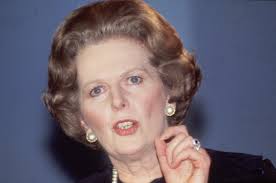Hi Sam, this is a very
good question - for her supporters, every improvement in general
welfare since the 1980s is down to her ideals and policies.

However, for
her detractors, every social and economic ill of the last 20 years is
a direct result of the same.
Both positions are patently unsupportable
- you only have to look at other similar countries, sometimes with
very different policies, to isolate the national and global trends
that would have prevailed regardless of who was in power. Here are
some examples...
Global
All rich economies were
becoming increasingly uncompetitive in manufacturing by the 1970s, as
first Japan and then the rest of South East Asia were re-integrated
into the world economy after the war, and as rich country wages
increased without accompanying increases in productivity and/or
weakening of currencies.
This was apparent well before Thatcher's
time, and a well-meant post-war obsession with full employment put
further pressure on wages and increased inflation, which just
amplified the trend.
In short, the industries that Thatcher is blamed
with destroying were already zombies, and would eventually have
needed to close, releasing workers and capital for whatever could be
found to replace them. In fact, if you look at rich countries decline
in the share of world manufacturing between 1980 and 1990, the UK's
was no more pronounced than the best performers such as Germany and
the USA.
Thatcher's contribution was to accelerate this inevitable
adjustment with the profound social consequences we are so familiar
with. Her acceptance of a floating currency also allowed our exports
to be competitive again.
The upside was that the UK was then ahead of
the game in the growing service-based economies such as finance,
which we are now so dominant in globally. The trends were
unavoidable, and every other rich economy has since had to enact
similar reforms to some degree, to face the reality of a changing
global economic landscape.
National
The UK suffered
particularly badly in the 1970s due to excessive union power pushing
up wages and depressing productivity with restrictive practices, and
the aforementioned full-employment goal, pursued with increasing
subsidies to industry, led to a crisis in government finance.
Our
creditors insisted on reforms that were already in place before
Thatcher, under Callaghan. It is disingenuous in the extreme to claim
that there were viable alternative approaches proposed by, say,
Labour, when many of the changes were already in place before 1979,
and any government would have found them necessary eventually.
Unemployment for example was headed skywards before Thatcher, and
many of the most controversial policies didn't really get going until
1984.
If I have learned
anything over the last 30 years, it is that all governments have a
lot less impact than they like to think, compared to the imperatives
of responding to events! They can however choose between facing the
inevitable and taking hard, unpopular decisions, or prevaricating and
leaving a future administration to pick up the pieces. We got the
former and reaped the rewards as well as paying the price...